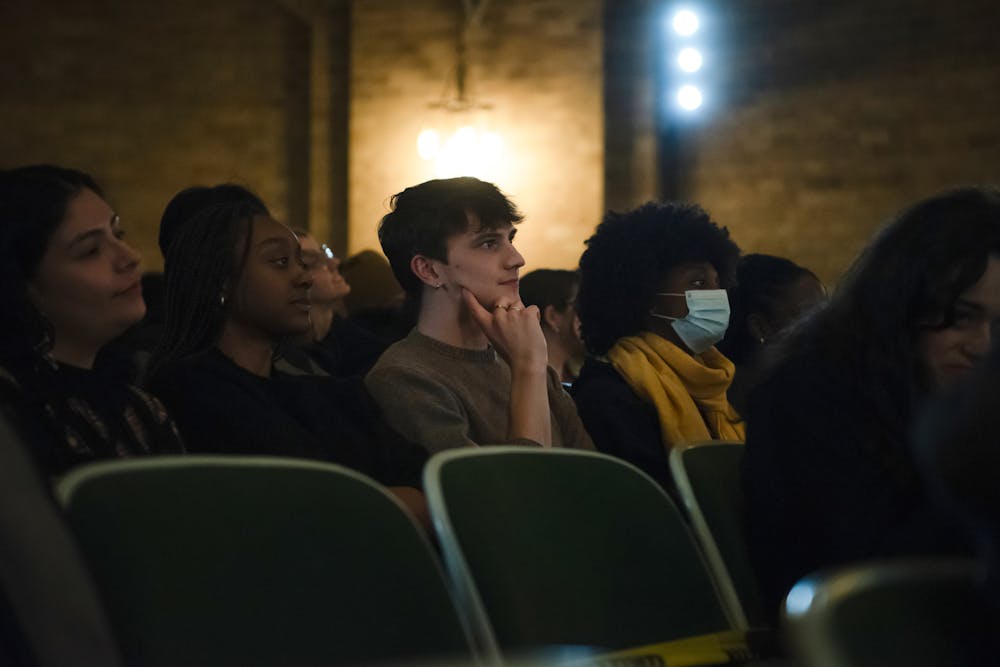
SPEC held a screening of Rachel Sennot's film on Feb. 21, 2024.
Credit: Chenyao LiuPerry World House hosted an event titled “The Role of Business Leaders in Addressing Bias and Hate” on April 22 featuring two prominent business leaders who discussed their role in combating hate in the modern world.
The event, which gathered around 50 attendees, was presented by Henry Schein CEO and Chairman Stanley Bergman and Ethan Allen Interiors Chairman and CEO Farooq Kathwari and moderated by Deborah Amos, a Ferris Professor of Journalism in Residence at Princeton University. Bergman and Kathwari talked about how hate manifests itself in different forms, and how business leaders have a unique responsibility to counter it.
“It may begin with Jews, it never ends with Jews. It may begin with Muslims, it never ends with Muslims,” Bergman said at the event. “At the end of the day, we are not dealing with antisemitism, we are not dealing with Islamophobia, we’re dealing with hate: people that are insecure in one area, people that have a narrative … and are using hate to drive a narrative.”
Bergman and Kathwari co-chair the Muslim-Jewish Advisory Council, a national interfaith organization founded in 2016 dedicated to fighting hate in the United States. According to its website, the council “brings together recognized business, political, and religious leaders in the American Jewish and American Muslim communities to advocate jointly for issues of common concern.”
Bergman also discussed his upbringing in apartheid-era South Africa and how it shaped his experience with hate. He evoked the German pastor Martin Niemöller, who wrote the “First they came” poem, which criticized inaction during the Holocaust.
“That was the home I grew up in,” he said. “This was a community with people from all over the former British Empire, people from the Far East, from what is today Indonesia, from the south continent of India, from Hong Kong, Muslims, Jews, Christians, Hindus, everybody got along, and that was where my life took place.”
“That’s where I learned the value of different religions, of multiculturalism, and that’s what I learned that you’ve got to listen to people,” Bergman added.
Kathwari stressed the importance of going beyond messaging and taking active measures to face hate head on.
“Messages are never loud enough,” Kathwari said. “We spend a fortune on advertising, it’s never enough. So we always recognize that messaging is not ever enough. It’s got to be tremendously elevated. Otherwise it’s not going to be heard, and it’s not going to be consistent. And it has to be consistent; that’s the job of leadership.”
In an interview with The Daily Pennsylvanian, Amos noted the role of online misinformation in the spread of hate across the globe.
“Misinformation is killing us,” Amos said. “The internet contributes to this problem, where you can be in your information bubble. You can read, ‘there are terrible things happening, and we know who’s to blame,’ and it’s really hard to combat that. Nobody’s quite figured out how to do it.”
Amos also explained why it is important for business leaders to talk about hate.
“In the simplest terms, it’s bad for business. Hate is bad for business,” she said. “When you’re selling something, you want to sell to everybody. And so you can’t cut off anybody, and you have to make sure that your own employees don’t think like that, because you want to sell to everybody. And they know that, because these guys are very successful business people, where the bottom line is their metric. And so if you want to sell to everybody, hate is your enemy.”
The Daily Pennsylvanian is an independent, student-run newspaper. Please consider making a donation to support the coverage that shapes the University. Your generosity ensures a future of strong journalism at Penn.
Donate







